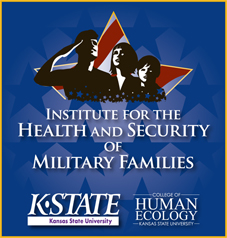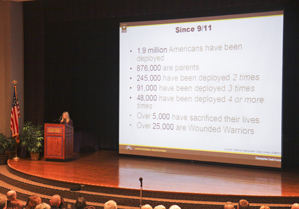K-STATE'S COMMITMENT TO THE MILITARY FAMILY CELEBRATED WITH NEW INSTITUTE
Today's brand of war is clearly having an impact on American soldiers and their families. That's why active partnerships like the one between Fort Riley and K-State's new Institute for the Health and Security of Military Families are critical.
 "Multiple long-term deployments are the norm and will remain the norm, and all this is starting to take a toll," said Lt. Gen. Robert E. Durbin during the institute's inaugural lecture Oct. 2. "While fighting two simultaneous wars, we have soldiers and families that are feeling the stress and strain of multiple long-term deployments. We're seeing this in alcohol abuse, high rates of divorce and even suicide.
"Multiple long-term deployments are the norm and will remain the norm, and all this is starting to take a toll," said Lt. Gen. Robert E. Durbin during the institute's inaugural lecture Oct. 2. "While fighting two simultaneous wars, we have soldiers and families that are feeling the stress and strain of multiple long-term deployments. We're seeing this in alcohol abuse, high rates of divorce and even suicide.
"We don’t know what the lasting impact will be, but you can help us determine what they are and how we can deal with them," he said, referring to role of the institute's experts. "Your efforts will not only improve the lives of soldiers stationed here in the Fort Riley community, but will also benefit soldiers and families across the entire Army and across the entire nation. You have already met us more than half way."
During "Army Family Strong: Lightening Their Load," Durbin and his wife Diana officially kicked off the institute's opening.
Their message: in order for the U.S. military to remain strong, the families that support them must be well taken care of and have their needs met.
K-State's new Institute for the Health and Security of Military Families will coordinate the multitude of research and outreach programs that touch on the well-being of military personnel, veterans and their families after the battle. The institute will also oversee comprehensive research on military family issues and address the current and future needs of military families through a variety of channels. Briana Nelson Goff, professor in the School of Family Studies and Human Services and associate dean of the College of Human Ecology, will serve as the institute's director.
Lt. Gen. Robert and Diana Durbin were stationed at Fort Riley from July 2007 to July 2008, when he was commander of the post and the First Infantry Division. Lt. Gen. Durbin has since been promoted to special assistant to the U.S. Army chief of staff for enterprise management.
During the lecture, the Durbins stressed the impact of deployment on families and the need for additional family support.
 Diana Durbin recounted her astonishment when her husband was deployed for the first time in the 1970s.
Diana Durbin recounted her astonishment when her husband was deployed for the first time in the 1970s.
"This was not what I had signed up for. I had left my family to be with my husband, I was now living hundreds of miles from my family and was now going to be thousands of miles away from my husband," she said. "It was beyond my imagination that they could actually expect you and find it acceptable to have a husband and wife separated and to live that way."
However, that was more than 30 years ago. Today, families are separated for many months -- often longer than a year -- and while there are many support structures in place, the stress endured takes its toll.
"In today's Army, it's not just the solider we ask to endure the multiple long-term deployments, but also the families," she said. "They endure stresses and strains that most of us can't even fathom."
The Durbins said this is why community support and partnerships like the new institute are critical to ensuring that military families have the support and resources they need to thrive.
"We as neighbors, as a community, as an Army and as a nation owe it to our soldiers and families to provide the best medical care, educational opportunities, housing and employment that we can," Diana Durbin said. "We can no longer only say the Army takes care of its own. We can no longer just say 'an Army of one.' The Army needs the involvement of the community and a partnership. They need teamwork to lighten the load."
K-State President Kirk Schulz said the university is more than happy to partner with the military in this endeaver.
"It's terrific to see the partnerships continue to develop between K-State and our military partners," he said. "We really want to set the national stage to prescribe the relationships that can exist between our military partners and a university."
For more information about the institute, go to http://www.militaryfamilies.k-state.edu
Photo: Speaking about the impact of war on military families, Diana Durbin cites several statistics associated with the wars in Afghanistan and Iraq.